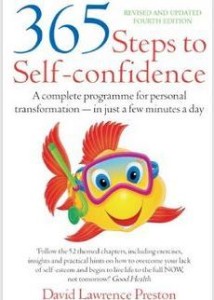Whether a parent, teacher or simply a friend of the family, the most important thing an adult can do for a child is to help build their confidence and self-esteem.
High self-esteem can only be learned from parents who have solid sense of their own self-worth.
How can we place self-esteem at the heart of our work raising children? Here are some tips (born of hard-won experience!):
- Once it was believed that all that was required of a parent was to feed, clothe, educate and discipline their children. Nowadays, it is recognised that psychological ‘food’ is just as important. Tell them you love them, often. Give them plenty of hugs (these provide a feeling of security).
- Don’t just tell them how to behave – show them. Young children model themselves on their adult caretakers. They learn best by example and soon observe if their parents’ words and deeds to not match up. Work on your own self-esteem and demonstrate it in your words and actions.
- Spend time doing things together. In a recent study, working parents claimed to give their children an average of an hour a day, but observation revealed that they gave them their full attention for less than five minutes! Listen to them. Help them, but don’t take over: let them learn to do it for themselves. Just being with them and letting them talk about the issues in their lives (however trivial they may seem to you) – is equivalent to telling them you love them.
- What you say to children – and how you say it – matters. Adults are often unaware of the hidden messages expressed in their tone of voice, facial expression and body language. Avoid disparaging remarks – a hurtful remark taken to heart by a child can have long-lasting repercussions. Never use sarcasm. Children don’t understand it. They find it confusing and unsettling.
- Don’t lie. Children find it hard to understand why adults tell them not to lie and then lie themselves. How can a child make sense of an adult who says one thing and then does another?
- Children who are told they are stupid, clumsy, ugly etc. grow up believing it – whatever the truth. Children don’t have the ability to reason as adults. They take it all on board.
- Don’t compare them with other children. ‘Why don’t you work as hard as Johnny?’ is more likely to result in children resenting Johnny than making a greater effort themselves.
- Of course children need discipline. Even the best behaved children have to be told off from time to time. When this is necessary, comment on their behaviour, not on their character. Point out what they have done wrong and how they can do better next time. Reassure them you love them. This way, children keep their dignity while learning to correct their mistakes. Children respond best to loving support, not verbal abuse.
- If the offence is serious, isolate them for a short time. Send them to their room, alone. This gives them an opportunity to cool off and reflect on what they’ve done.
- When they behave well, reward them. A smile, a word and a hug do wonders for morale. But don’t be drawn into bribery. Good behaviour is better taught than bought!
- However, excessive or insincere praise can be damaging. If everything a child does is ‘fantastic’, then nothing is special. Children recognise empty words; unwarranted praise gives a child the impression that second-rate is good enough.
- Set a good example by setting your own goals, and help children to set goals too. Be sensitive though: too much pressure can build resentment and make them give up altogether.
- Gradually give children more responsibility. Make them accountable for their actions by accepting the consequences. For instance, if they forget their lunch box, make them go without – they won’t forget again. Sheltered children rarely cope well as adults. The ultimate goal of a good parent is to teach them to stand on their own feet, and be happy, competent, fulfilled and contributing members of society.
All parents know they day they’re born that one day their children will grow up and leave the nest. When they are ready, let go. Your job is done.
©David Lawrence Preston, 4.6.2016
Follow me on Facebook and Twitter @David_L_Preston
How To Books 2010


Leave a Reply